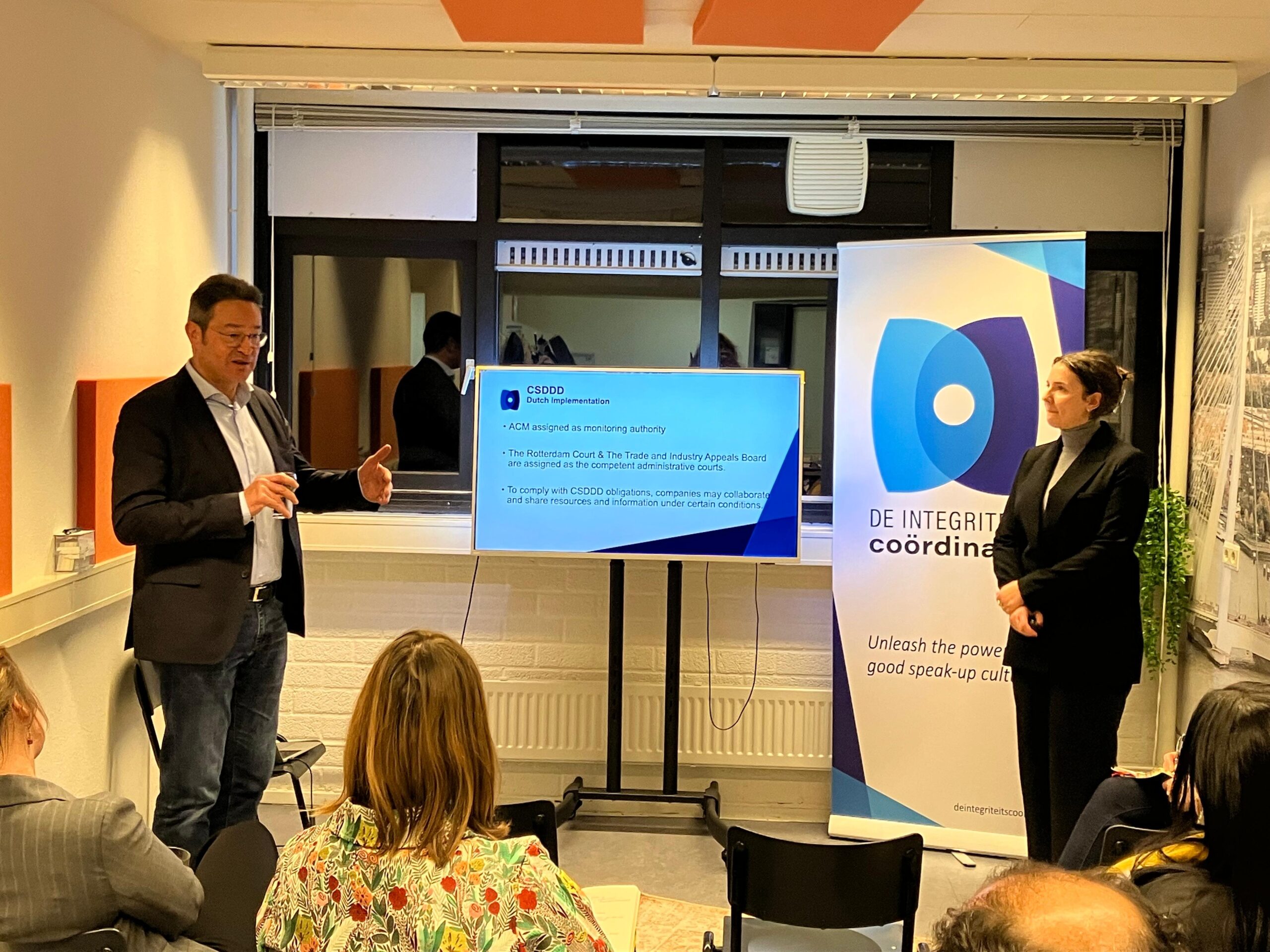The Week of Integrity 2024 took place from Dec. 9 to 13. This is an annual integrity week, with a focus on sustainability this year. The organizer of the week, ICC Netherlands, started a collaboration with Transparency International Netherlands for this edition. See also here.
The Integrity Coordinator had also joined this year as a partner in The Week of Integrity. In keeping with the theme of the week, we hosted an English-language event at our Rotterdam office entitled, “The Grievance Mechanism and The Whistleblower Procedure: Differences and Similarities.” Everyone was invited to discuss the “grievance mechanism” from the Corporate Sustainability Due Diligence Directive (CSDDD).
The CSDDD is an EU directive that requires large companies to identify and take action on negative human rights and environmental impacts in their own operations, and their value chain.
During the event, the key components of the CSDDD were named, followed by a deeper look at the so-called “grievance mechanism,” one of the obligations within this legislation, which requires large companies to open up a reporting and grievance procedure to their entire supply chain. We also discussed the differences and similarities with the Whistleblower Protection Act.
Eventually, all companies with more than 1,000 employees and more than 450 million euros in sales must set up such a “grievance” procedure. Non-EU companies with more than 450 million euros in EU turnover must also comply. In itself, these are not that many companies, but they employ a lot of people. And there is a chance that these companies will ask their suppliers to set up something similar.
Each EU member state must appoint a body to oversee this. In the Netherlands, that will most likely be the ACM. Fines can be levied up to 5% of the company’s global turnover. Companies may additionally be held liable if they knowingly violate human rights or environmental laws or fail to prevent, stop and/or remedy negative impacts in their own operations and their supply chain.
Both natural persons and organizations, such as trade unions or other civil society organizations, should be given the opportunity to file a report or complaint about potential or actual adverse human rights and environmental impacts. This can include the company’s own operations, as well as everything in their value chain. Reporters must then have a reasonable suspicion of the negative impact of these activities. They have the right to discuss this with a company representative. Companies are required to follow up on these reports and complaints, indicate how they will do so, and whether or not they think the report or complaint is justified.
The process must be publicly available, predictable, transparent and fair. Unions or other forms of employee representation must be informed of the procedure. The recipient of the report must keep the identity of the reporter confidential to avoid disadvantaging the reporter. Under certain conditions, companies may also act jointly and share resources and information.
Here, of course, we see some similarities to the whistleblower procedure. Even there, the procedure must be communicated to employees and the identity of the reporter kept confidential to avoid harm. Reports may be made of violations of laws and regulations, including human rights and environmental laws, in a work-related context, by employees but also by suppliers. The whistleblower procedure need not be made publicly available but may be; it is a good practice in itself. At the same time, however, there are also major differences between the two different reporting/complaint procedures.
After listing the main similarities and differences, there was an opportunity to ask questions and participate in an interactive discussion.
For example, the question is who will sit behind the reporting desk. Will that be the ethics & compliance officer? Or does it make more sense for someone from procurement/supply chain management to handle the reports? The conclusion was that this can vary from company to company.
However, we did agree that it would be useful to have a single point of contact for all kinds of reports, whether they are whistleblower reports, complaints about human rights/environmental violations in the supply chain or reports about undesirable behavior. Otherwise, there is a danger that reporters will not be able to find the right counter. What needs to be reported where? Some types of reports can be reported at multiple counters. Then it is better to just offer a reporting desk. Behind the hotline, however, reports can then be distributed to the appropriate handler.
It was clear that some things are not yet fully crystallized. If only because the consultation on Dutch legislation implementing the CSDD has only just begun. In any case, we look back on a great session, which focused on ethics, fair business and sustainability, and look forward to a promising next edition in 2025. Follow us on LinkedIn or subscribe to the newsletter to stay informed.


